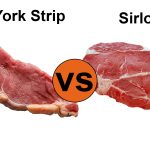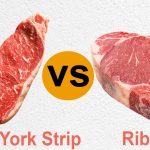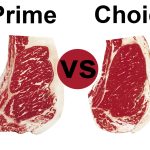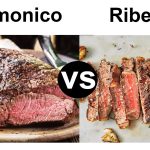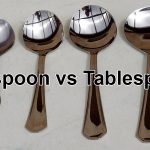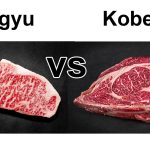When it comes to luxurious beef, there are few tastier options out there than authentic Wagyu beef. Originating from Japan, “Wa” meaning Japanese and “gyu” meaning cow or ox, this remarkable breed of cattle has been highly sought after for hundreds of years due to its incredibly rich flavor and incredibly tender meat.
But what is the difference between American Wagyu and Japanese Wagyu? In this blog post we will delve into the details that make both of these so special; you may be surprised at how differing their production methods can be! Keep reading to learn more about each type from where they come from, what makes them unique, right down to types of cuts available and ideal cooking techniques.
What Is American Wagyu?
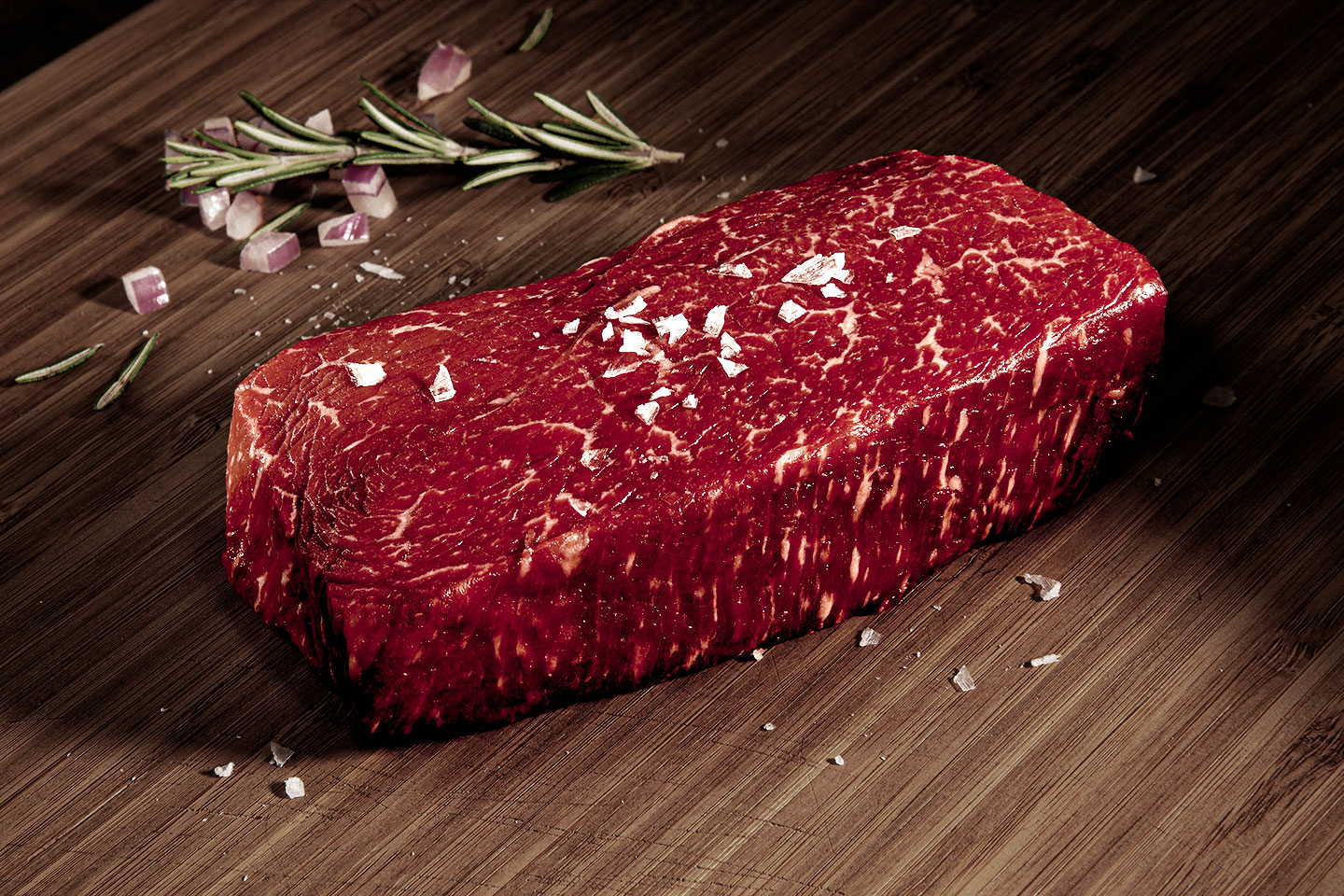
To understand American Wagyu, it helps to know that the term “Wagyu” is a blanket term for any type of Japanese cattle. The most famous and sought-after of these is Kobe beef, which is from the Tajima strain of Wagyu cattle that originated in Hyogo Prefecture and has a distinct marbling pattern.
American Wagyu is a cross between traditional Japanese cattle breeds and other breeds such as Angus or Holstein. This hybridization was done to achieve higher meat yields with less fat content than what would be found in purebred Wagyu cows.
History of American Wagyu
American Wagyu was first introduced to the United States in 1975 when a handful of cows and bulls were imported from Japan. Since then, multiple generations of crossbreeding have taken place resulting in cattle that are highly sought after for their high-quality meat with superior flavor and marbling.
American Wagyu Nutrition Facts:
Serving size: 3 ounces (85g)
Calories: 155
Fat: 8.9g
Saturated fat: 2.8g
Trans fat: 0.1g
Cholesterol: 69mg
Sodium: 68mg
Carbohydrates: 0g
Fiber: 0g
Sugars: 0g
Protein: 23.3g
Vitamins and Minerals in American Wagyu Beef : Vitamin B12, Iron, Phosphorus, Selenium, Zinc, Magnesium and Potassium.
American wagyu beef is rich in heart-healthy omega-3 fatty acids and conjugated linoleic acid (CLA). It contains monounsaturated fats, which are beneficial for heart health. The high levels of CLA have been associated with lower cholesterol and body fat levels, improved immune system function and even cancer prevention.
American wagyu beef is also an excellent source of protein and essential minerals such as phosphorus and selenium. Furthermore, this type of beef is a great source of vitamin B12, which helps the body to produce red blood cells that carry oxygen throughout the body. American Wagyu Beef is also rich in iron, which helps transport oxygen from one cell to another throughout the body.
What Is Japanese Wagyu?
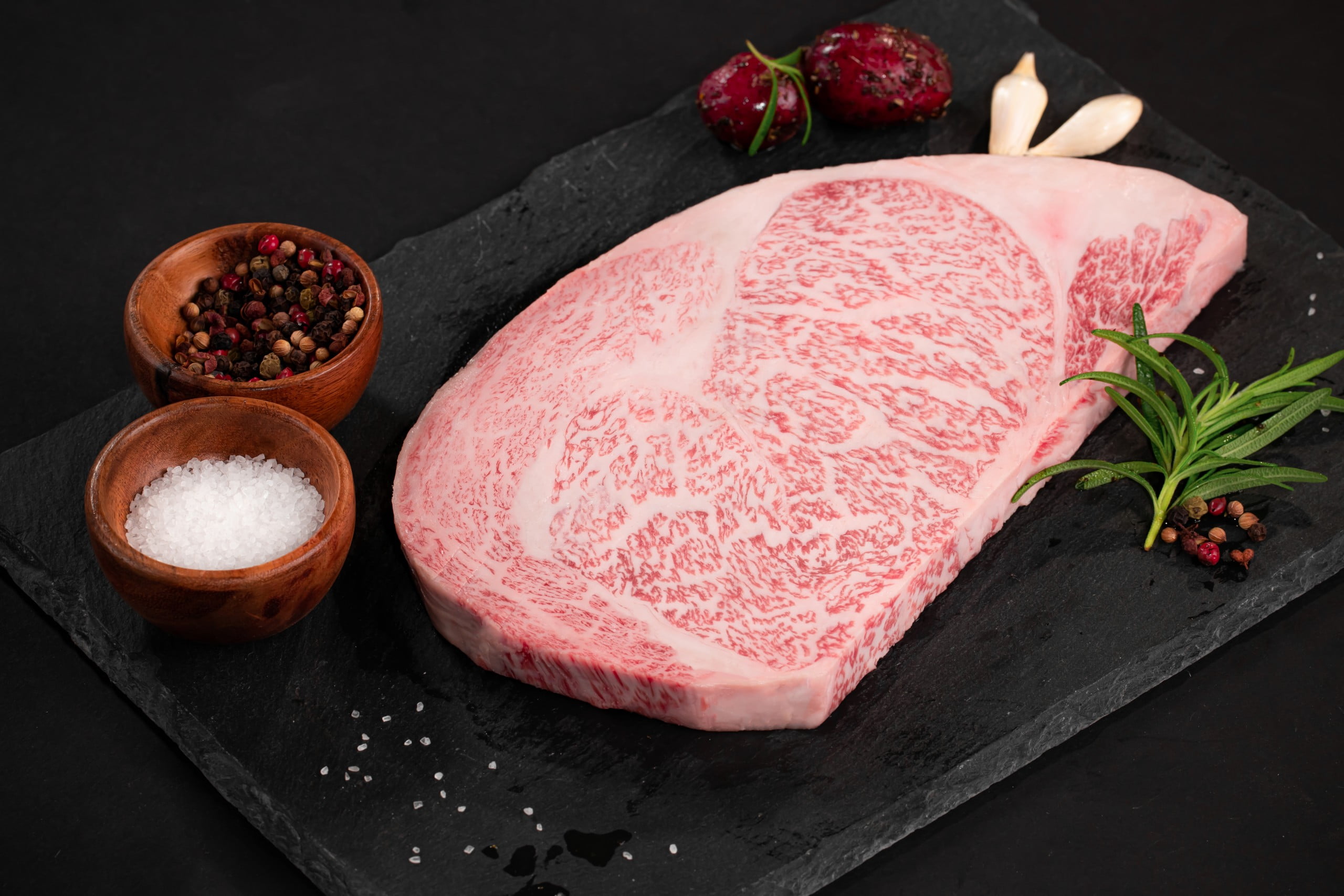
Japanese Wagyu on the other hand refers specifically to cattle descended from Tajima-gyu – the original Japanese Wagyu. This breed is known for its high-quality meat and intense marbling, which gives it a unique flavor and texture. Unlike American Wagyu, Japanese Wagyu cattle are raised in a very different way – with much more attention to detail given during the animals’ lives.
The cows are bred for multiple generations, carefully monitored for diet and exercise, massaged daily with sake and fed beer during summer months to promote appetite all of this is done in an effort to create the most delicious beef possible. As you might expect, these practices come at a premium cost due to their labour-intensive nature but the result is undeniably flavourful beef that few can resist!
History of Japanese Wagyu
The history of Japanese Wagyu dates back centuries to the mid-1800s when Tajima-gyu was first developed. The breed has since become highly prized for its delicious flavor and texture, with enthusiasts from around the world willing to pay a premium price for it.
Due to its popularity, most Japanese Wagyu is imported into other countries rather than produced in large quantities domestically. This ensures that only the best quality meat is available, as strict standards are always maintained in order to keep up with international demand.
Japanese WagyuNutrition Facts:
Serving size: 3 ounces (85g)
Calories: 188
Fat: 11.3g
Saturated fat: 4.6g
Trans fat: 0.0g
Cholesterol: 79mg
Sodium: 66mg
Carbohydrates : 0g
Fiber : 0g
Sugars : 0g
Protein : 23.2g
Vitamins and Minerals in Japanese Wagyu Beef : Vitamin B12, Iron, Phosphorus, Selenium, Zinc, Magnesium and Potassium.
Japanese wagyu beef is slightly higher in calories than American wagyu beef but it also contains more essential vitamins and minerals. It has a higher fat content than American wagyu with 11.3g per 3 ounce serving compared to 8.9g in the same size serving of American Wagyu Beef. The fat in Japanese Wagyu Beef is mostly monounsaturated which is beneficial for heart health.
Like American Wagyu Beef, Japanese Wagyu Beef is an excellent source of protein and essential minerals such as phosphorus and selenium. Furthermore, this type of beef is a great source of vitamin B12 which helps the body to produce red blood cells that carry oxygen throughout the body. It also contains large amounts of iron which helps transport oxygen from one cell to another throughout the body.
Japanese Wagyu Beef is also rich in zinc which plays an important role in many bodily processes including growth and development, blood clotting, and immunity. Zinc is also essential for the production of proteins and enzymes in the body. Additionally, Japanese Wagyu Beef has higher levels of omega-3 fatty acids and conjugated linoleic acid (CLA) than American Wagyu beef, making it even more beneficial for heart health.
What Is The Difference Between American Wagyu and Japanese Wagyu?
The main difference between American Wagyu and Japanese Wagyu is the way they are raised. All cattle used for both types of beef must have the same genetic background, however, Japanese Wagyu cattle are bred for multiple generations, carefully monitored for diet and exercise, massaged daily with sake and fed beer during summer months to promote appetite – all of this is done in an effort to create the most delicious beef possible.
In terms of nutrition content, Japanese Wagyu contains slightly higher amounts of calories, fat and essential vitamins and minerals than American Wagyu. Additionally, it contains higher levels of monounsaturated fats which have been linked to improved heart health. However, American Wagyu has a lower saturated fat content making it more appropriate for those on a lower fat diet.
Overall, both types of Wagyu Beef are incredibly delicious and nutritious. American Wagyu is more widely available and generally less expensive, whereas Japanese Wagyu has the reputation for being higher quality and is typically only served in high-end restaurants or specialty stores.
6 Keys Difference between American Wagyu and Japanese Wagyu?
1. Genetics: Japanese Wagyu cattle are bred from multiple generations and carefully monitored for diet, exercise and massage with sake while American Wagyu cattle have fewer generations of breeding to maintain quality.
2. Exercising: Japanese Wagyu cattle receive daily exercises to improve the flavor of their meat while American Wagyu does not receive any exercising.
3. Diet: Japanese Wagyu is fed a special grain-based diet that includes beer during the summer months in order to promote appetite, whereas American Wagyu has no such dietary protocol.
4. Massage: Japanese Wagyu cattle are massaged daily with sake which helps tenderize their meat while American wagyu do not undergo this process.
5. Fat Content: Japanese Wagyu has a higher fat content than American Wagyu with 11.3g per 3 ounce serving compared to 8.9g in the same size serving of American Wagyu Beef.
6. Nutritional Value: Japanese Wagyu has slightly higher amounts of essential vitamins and minerals such as phorus, selenium, zinc, magnesium and potassium than American Wagyu. Additionally, it contains higher levels of monounsaturated fats which have been linked to improved heart health. However, American Wagyu has a lower saturated fat content making it more appropriate for those on a lower fat diet.
Similarities of American Wagyu and Japanese Wagyu?
1. Genetics: Both American Wagyu and Japanese Wagyu cattle must have the same genetic background in order to be considered true Wagyu Beef.
2. Flavor: Both types of Wagyu Beef are known for their exquisite flavor profile, typically described as being buttery, tender and flavorful with intense marbling throughout the meat.
3. Nutrition Value: Both American and Japanese Wagyu are high-quality sources of protein, iron and omega-3 fatty acids which are essential for a healthy diet. Additionally, they both contain large amounts of zinc which helps transport oxygen from one cell to another throughout the body and aids in many bodily processes including growth and development, blood clotting, immunity and production of proteins and enzymes.
4. Availability: Wagyu Beef is becoming increasingly more available across the United States with American and Japanese Wagyu both being easily accessible in specialty markets, high-end restaurants and even online.
5. Price: Generally speaking, Japanese Wagyu tends to be more expensive than American Wagyu due to its higher quality and rarity; however, both can be found at competitive prices depending on vendor or market.
6. Cooking: Both types of wagyu beef are best cooked using low heat over a long period of time in order to ensure maximum tenderness and flavor. Additionally, they should always be served medium-rare or rare in order to preserve the juicy texture and flavor profile of the beef.
American Wagyu vs Japanese Wagyu – Which is Healthier?
Both types of Wagyu Beef are considered to be very healthy sources of protein, iron and omega-3 fatty acids. However, Japanese Wagyu tends to have a slightly higher fat content than American Wagyu which can make it more calorie dense.
Additionally, since Japanese Wagyu has higher levels of monounsaturated fats, it is believed that consuming this type of beef may help improve heart health due to its cholesterol reducing benefits.
Therefore, when considering the health implications of either type of wagyu beef, Japanese Wagyu appears to be the winner. Both types can provide important nutritional benefits when enjoyed in moderation as part of an overall healthy lifestyle.
Types Of Cuts Available And Ideal Cooking Techniques
American Wagyu is available in a variety of cuts from striploin to ribeye steaks, burgers and roasts. Because it contains more fat than traditional beef, American Wagyu should be cooked low and slow so that the fat can render and keep the meat juicy.
Japanese Wagyu is best enjoyed as steak cuts – sirloin, ribeye and strip loin are all popular options. Due to its dense marbling, Japanese Wagyu should only be cooked quickly over high heat to allow its natural juices to stay locked within the meat while still achieving a succulent texture.
American Wagyu vs Japanese Wagyu: Cooking Tips & Suggestions
When cooking American Wagyu, the key is to cook it low and slow. This will allow the fat to render out and keep the meat juicy.
When cooking Japanese Wagyu, you should use a very high heat for a short period of time in order to sear the outside of the steak while still keeping it rare or medium-rare on the inside. Additionally, if you are using marinades, make sure that they do not contain too much acid as this could cause the beef to become tough.
Where to BuyAmerican Wagyu vs Japanese Wagyu Online?
Both American Wagyu and Japanese Wagyu can be found online from specialty markets, high-end restaurants and even online retailers. When shopping for these types of beef, make sure that you are purchasing quality cuts that have been graded appropriately. Additionally, it is best to purchase your wagyu beef from a reputable source in order to ensure the highest quality product.
When looking for the best deal on either type of wagyu beef, try to find a vendor or retailer who offers discounts or promotions during special holidays such as Christmas or Thanksgiving. This way, you can enjoy some of the best meat available at an affordable price.
FAQs: American Wagyu vs Japanese Wagyu
What is the difference between American Wagyu and Japanese Wagyu?
The main differences between the two are in terms of marbling (American Wagyu tends to have less fat than Japanese Wagyu), quality (Japanese Wagyu is graded higher than American Wagyu) and price (Japanese Wagyu tends to be more expensive). Additionally, Japanese wagyu should be cooked quickly over high heat while American wagyu should be cooked low and slow.
Is either type of wagyu beef healthier?
Both types of wagyu beef offer important nutritional benefits including protein, iron, omega-3 fatty acids and monounsaturated fats. However, since Japanese Wagyu has higher levels of monounsaturated fats, it is believed to be slightly healthier than American Wagyu.
Is American Wagyu as good as Japanese Wagyu?
Although Japanese Wagyu is generally considered to be of higher quality, both types of wagyu beef can provide delicious and nutritious meals when cooked correctly. Ultimately, the choice between American Wagyu and Japanese Wagyu should come down to personal preference.
How should I cook American and Japanese Wagyu?
When cooking American Wagyu, the key is to cook it low and slow in order to allow the fat to render out and keep the meat juicy. When cooking Japanese Wagyu, you should use a very high heat for a short period of time in order to sear the outside of the steak while still keeping it rare or medium-rare on the inside. Additionally, if you are using marinades, make sure that they do not contain too much acid as this could cause the beef to become tough.
What other ways can I enjoy wagyu beef?
Aside from steaks and burgers, wagyu beef can also be enjoyed in a variety of other dishes. Soups, stews and even casseroles can benefit from the succulent texture that wagyu beef provides. It is important to note that when cooking these dishes, it is best to use low heat for an extended period of time in order to achieve a succulent texture.
Can I freeze wagyu beef?
Yes, you can freeze wagyu beef if needed. When freezing this type of high quality steak, make sure to wrap it tightly in plastic wrap or freezer-safe bags before placing it into the freezer. This will help prevent freezer burn and ensure optimal taste and texture once thawed. Additionally, make sure to label and date all packages so that you can easily identify what they contain.
Is American Wagyu worth it?
American Wagyu is a high quality type of beef that can be enjoyed for its full flavor and tender texture. Although it may be slightly more expensive than other cuts, it can provide an unforgettable culinary experience when cooked correctly. Ultimately, the decision to purchase American Wagyu should come down to personal preference and budget.
Is wagyu beef unhealthy?
Wagyu beef is not considered unhealthy due to its high levels of monounsaturated fats and omega-3 fatty acids. Additionally, wagyu beef offers important nutritional benefits such as protein and iron. However, since wagyu beef is higher in fat than other cuts of meat, it should be consumed in moderation. Additionally, it is important to keep the cooking method in mind when preparing wagyu beef as this can have an impact on its nutritional value.
Why is Japanese Wagyu more expensive than American Wagyu?
Japanese Wagyu is more expensive than American Wagyu due to its superior marbling, higher quality and limited availability. Additionally, the cost of production for Japanese Wagyu is significantly higher as it requires much more time and care when raising the cattle. This is why it can often be found at a significant price premium compared to other types of beef.
What are some tips for cooking wagyu beef?
When cooking wagyu beef, there are a few important tips that should be kept in mind in order to achieve optimal flavor and texture. First, make sure to season the steak generously with salt and pepper before cooking. Additionally, use a cast iron skillet or grill over high heat in order to quickly sear the outside of the steak without overcooking the inside. Finally, make sure to let the steak rest for at least 10 minutes before slicing and serving in order to ensure that all of the juices are retained.
Conclusion:
After examining American Wagyu and Japanese Wagyu, it is evident that the two have different characteristics that affect the flavor profile and what they offer the consumer. American Wagyu is a great option for individuals who want to experience a high-quality steak without breaking their budget, while Japanese Wagyu offers an exquisite culinary experience with its unique flavor profile and melt-in-your-mouth texture.
No matter which type of Wagyu you choose, it will be a savory delight your taste buds will enjoy. Food connoisseurs can take advantage of both varieties to maximize their culinary experiences and ensure that each savory bite lives up to their expectations. Whether you prefer the luxurious feel of Japanese Wagyu or the affordability of American Wagyu, this exceptionally delicious meat is sure to bring joy to any dinner table.

William Lariviere is a chef and restaurateur with over 25 years of experience in the food industry. He is the owner and operator of Swartzsdeli.com, an online restaurant that specializes in gourmet sandwiches and salads, grill & smoke. He likes to share experience, food, recipes cooking knowledge as well as reviews about restaurant and kitchen products.
William’s goal is to provide his customers with healthy, delicious food that is also affordable and develop Swartzsdeli.com into a comprehensive information site specializing in cooking and cuisine to a new level to help reach a wide range of housewives and readers.


